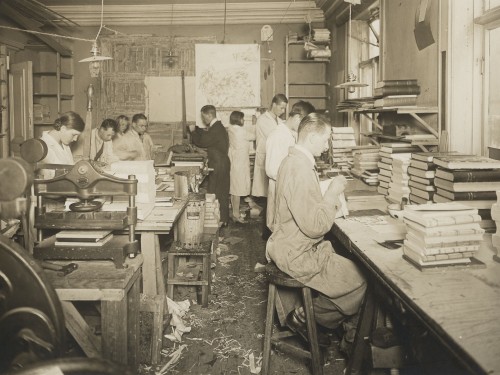Professions
For generations, deaf people have had to battle prejudices and ideas that deaf people are not capable of working in certain professions. Deaf people have heard from their teachers, student counsellors and parents that ‘a deaf person can’t do that’. Despite this, deaf people demonstrated that they can and succeeded in entering one profession after Lue lisää
Read more
Different jobs
In the late 19th century, the majority of Finns worked in agricultural or manual work occupations. Most deaf people also worked in such jobs. In schools for the deaf, tuition gave pupils basic skills as artisans, and many deaf people also learned the profession by working with artisans. At the time, deaf people also worked Lue lisää
Read more
Discussion on vocational training
During the period of oralism, the task of schools for the deaf was to integrate deaf people into the hearing society. In the early 20th century, teachers thought that deaf people do not require vocational training designed specifically for them. It was thought that they could study in mainstream educational institutes because they could lipread and Lue lisää
Read more
Interpretation services open up new study opportunities
In autumn 1976, the first two deaf students were admitted to do upper secondary school studies at the Mikkeli school for the deaf. Even though deaf students could now sit the matriculation exam, they still did not have many opportunities for further education at universities. In 1980, Finnish universities only had three deaf students and Lue lisää
Read more
First vocational schools
In the early 20th century, a few private vocational collages were founded, and they offered deaf people better access to education. These included the Nikkarila household management school and the printing house, Surdus, which offered training in the printing sector. In Jyväskylä, a ‘theoretical and practical vocational school’ for deaf carpenters operated from 1911 to Lue lisää
Read more
Nikkarila household management school
Founded in 1905, Nikkarila household management school was sometimes called the deaf women’s academy. The school became possible when Sofia and Angelique Bovallius, sisters who lived in Pieksämäki, bequeathed their estate for the purpose at the end of the 19th century. The work to build the school began in 1903. The main building, which was Lue lisää
Read more
Surdus, a printing house for deaf people
At annual meeting of the Association for the Deaf in 1928, the deaf bookbinder Oskar Wetzell pointed out that work in a printing house was suitable for deaf people. According to him, deaf people should found their own printing house that could also offer training. Wetzell had worked as a bookbinder for 20 years and Lue lisää
Read more
Turku’s vocational school for the deaf
In 1930, the annual meeting of the Association for the Deaf set up a committee to plan an educational institute that would offer vocational training to deaf students. However, the plan was not executed until 1948 when Turku’s vocational school for the deaf began its operations. The school received 59 applications and 17 students were Lue lisää
Read more
- occupations
-
personal history
-
Rurik Pitkänen

-
Torsten Rikström

-
Svante Lagergrén

-
Savisaari family

-
The Ritalas and the Talvias

-
The Stadius

-
Raija Nieminen

-
Elin Carlstedt

-
Oskar Wetzell

-
Martin Hellöre

-
Maria Lovisa Klingenberg

-
Julius Hirn

-
Jarmo Narmala

-
John Sundberg

-
Ida Mouton

-
Hulda Hakala

-
Elma Eklund

-
Fritz Hirn

-
Carl Henrik Alopaeus

-
Bruno Mouton

-
Aura Ahlbäck

-
Antti Jokelainen

-
Rurik Pitkänen
- organizations
-
deaf education
-
Deaf education

-
Early stages of deaf education

-
Argillander as a trailblazer

-
Malm’s school in Porvoo

-
A state school begins operations in Turku

-
More schools are founded

-
Goals of deaf education

-
The goals change

-
The era of oralism

-
The school system undergoes changes

-
Boarding schools

-
Sign language and bilingualism

-
Deaf education
- deaf awareness
- oralism
- family
- religious life